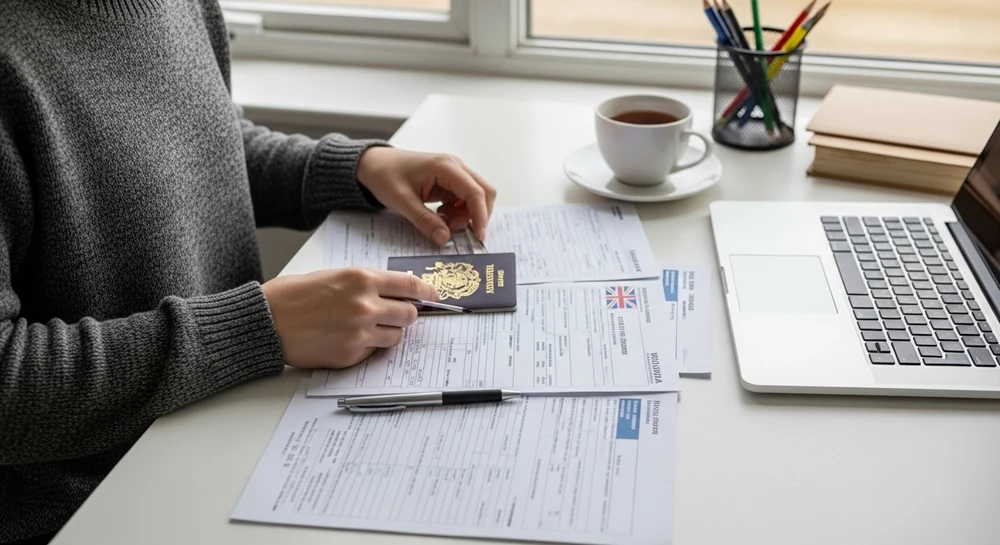20 Latest UK Visa Interview Questions in 2025 + Simple Answers
- Published by Max-B.
- October 30, 2025
- 15 min read
Table of Contents

During a UK visa interview, the questions, the papers, and the pressure are a lot! But don’t worry. At Visa Library, we’ve helped thousands of people figure this out step by step. In this guide, we’ll go through the real UK visa interview questions in 2025, what they mean, and how to answer them calmly and confidently.
If you still feel stuck after reading this, we’ve got your back. Visa Library offers premium visa consultations, so you can talk to someone who actually understands the process.
Top 20 UK Visa Interview Questions in 2025 & Answers
Here are the latest UK visa interview questions in 2025, and how to and how not to answer them:
What is the Purpose of Your Visit to the UK?
This question checks whether your purpose matches the visa type you’ve applied for and whether it’s clear and honest. You should answer by saying exactly why you’re going and what you’ll do: “I’m going to the UK to visit my cousin in London for two weeks and see some tourist sites.” Don’t answer with vague statements like “Just to travel and see what happens” or “Maybe I’ll stay longer if I like it”. That creates doubt about your intentions.
How Long Do You Plan to Stay in the UK?
With this UK visa interview question, the officer wants to see if your stay is realistic and matches your travel plan. A strong answer: “I will arrive on 10 July and leave on 24 July, staying 14 nights, and then return home.” A weak answer: “I’m not sure, maybe three weeks or a month,” or “I’ll leave when I’m ready,” because that makes your stay look open-ended and risky.
Who is Paying for Your Trip and Living Expenses in the UK?
This question checks if you can support yourself and won’t become a burden while in the UK. You should say something like: “I have saved £3,000 and my parents will support me with their bank statement showing funds of £10,000.” Avoid saying: “I’ll figure it out when I’m there” or “I’ll borrow money if I need it” because that looks unprepared and risky.
Do You Have Family or Friends in the UK?
The aim of this UK visa interview question is to understand your local ties and whether your visit has a clear plan. If you do, say: “Yes, my aunt lives in Manchester; I’ll stay with her for the first few days.” If you don’t, it’s fine to say “No, I don’t” and then explain your accommodation plan. But don’t claim you have someone when you don’t, because if they check and find it false, it damages your credibility.
What Do You Do for a Living in Your Home Country?
They ask this to see whether you have a stable life back home that you’ll return to. A strong answer: “I’ve worked as a graphic designer for five years in Mumbai and own a small flat there that I’ll go back to.” A weak answer: “I’m unemployed and hoping to find something overseas” or “I have casual jobs” because that suggests you might not return.
Have You Traveled Abroad Before?
This UK visa interview question checks if you know how visas work and whether you followed the rules before. If you have, you might say: “Yes, I visited Dubai in 2023 for one week and returned home on time.” If not, you could say: “No, this will be my first trip abroad.” What you shouldn’t do is lie about past travel or hide details because that can be discovered and may cause rejection.
Why Did You Choose the UK and Not Another Country?
They want to see that your decision is thoughtful and genuine. You could answer: “I chose the UK because I’ve always been interested in British history and culture and want to visit museums in London that aren’t available in my country.” What to avoid: “Because it’s easier to get a visa there,” or “Because everyone goes there,” because it sounds weak and not well-thought-out.
What are Your Travel Plans in the UK?
This UK visa interview question checks if you’ve made real arrangements and have a clear itinerary. A good answer: “I will stay at Hotel X in Edinburgh for three nights, then take a train to York and stay with my friend for two nights, and then fly home on 24 July.” A bad answer: “I’ll just find a place when I arrive and decide things on the spot,” because that looks unplanned and risky.
What Ties Do You Have to Your Home Country that Make You Return after Your Visit?
The officer asks this UK visa interview question to see if you’re likely to leave the UK when you’re supposed to. You could say: “I have my business and my family back home; I own a shop and my parents live there.” Avoid saying: “I don’t have a lot waiting for me back home” or “I might stay if I like it” because that raises red flags.
Do You Plan to Work or Study in the UK While You are There?
They ask this especially for visa types where work or study is not allowed or is limited. You should answer truthfully: “No, I do not plan any paid work. I will only visit the UK for tourism.” If you do plan some approved study or work and your visa allows it, say so and explain clearly. What you must not say is: “Yes, I’ll try to find a job while I’m there” if your visa doesn’t allow that, because that can lead to rejection.
What is Your Monthly Income?
The interviewer asks this UK visa interview question to see that your financial situation is stable and enough for your trip. You could say, “I earn £2,500 per month and I’ve been working at my current company for two years.” Don’t say, “I just started working and I might get paid more soon”. It’ll look unstable and uncertain.
Learn more about the steps of getting a UK work visa.
Have You Ever Been Refused a Visa for the UK or Another Country?
They ask this UK visa interview question to check your immigration history and whether you’ve had issues before. If you were refused, it’s better to be honest: “Yes, I was refused a tourist visa in 2019 for country X, but since then I’ve travelled to other countries and always followed their rules.” If you say, “No” when you actually were refused, or try to hide it, it can create more problems.
What Ties Do You Have at Home that Will Bring You Back after Your Visit?
This UK visa interview question checks if you have reasons to return home and not overstay. You might answer, “I have a permanent job, I own a house, and my family lives in my home country, so I will definitely return.” If instead you say, “I’m thinking about staying longer if I like the UK,” it raises doubts.
Do You Plan to Travel to the UK Alone or with Someone Else?
They ask this to understand your travel plan and whether it’s credible. A good answer: “I will travel with my friend, Ms. Lee, who is travelling at the same time and staying in London for five days.” A less believable answer: “I’ll travel alone and figure out everything when I get there,” because that sounds unplanned.
Where Will You Stay in the UK, and Have You Booked Accommodation?
This UK visa interview question checks whether you have real arrangements and a clear plan. You can say, “I have booked Hotel X in London for three nights and will stay with my cousin in Birmingham for the next four nights.” If you say, “I don’t have any bookings yet, or I’ll find something after I arrive,” that sounds risky.
If You are Visiting Friends/Family, How Long Have You Known Them, and How Often Do You See Them?
They ask this UK visa interview question to confirm the relationship and the reason for your visit. You could say, “My cousin lives in Manchester; I last saw them in 2022 when they visited my home country, and we speak every month.” If you say, “I met them once online, I’ll visit them for the first time,” without backup info, it may look weak.

What Will You Do If Your Travel Plans Change or You Need to Stay Longer?
They want to test how you handle changes and how committed you are to your plan. A good answer: “If my stay needs to be extended, I’ll come back, then apply again properly. This trip has fixed dates.” Avoid saying something like: “If I need more time, I’ll just stay longer in the UK” because that suggests you might overstay.
How Much Have You Saved for This Trip, and Do You Have Proof of It?
They ask this UK visa interview question to check that you have actual funds for your trip. You might say: “I have £4,000 saved in my bank account for this trip and I can show the statements for the last 3 months.” If you say, “I’ll save more money later” or “I’ll use credit cards when I’m there,” that looks unprepared.
Why Haven’t You Travelled Abroad Much Before, or Why Have You Travelled So Much?
They ask this UK visa interview question to evaluate your travel behaviour and whether your profile fits your reasons. If you haven’t travelled abroad, you can say: “This is my first visit abroad because my job started recently and I had responsibilities at home.” If you’ve travelled a lot but have no clear reason, saying “I travel when I feel like it” may raise suspicion.
What are Your Career or Educational Plans after You Return from the UK?
This question usually comes up at the UK student visa interviews. They want to know you have goals and will not just stay in the UK longer than allowed. You can say: “After my visit, I will return to my company and continue my role as marketing manager, and I plan to complete a certification, which I will start next month.” Saying “I’ll decide what to do after I return” or “Maybe I’ll look for jobs in the UK” will sound vague and risky.
Essential Documents to Bring
- Valid passport with blank visa pages
- Completed the UK visa application form
- Appointment confirmation or interview letter
- Proof of payment for the visa fee
- Recent passport-size photos (as per UKVI rules)
- Proof of financial stability (bank statements, salary slips, sponsorship letter)
- Proof of employment or enrollment (job letter, student ID, or admission letter)
- Travel plan or itinerary (flight bookings, hotel reservations, or invitation letter)
- Proof of accommodation (hotel confirmation or host’s address and contact details)
- Documents showing ties to the home country (property papers, family details, or return ticket)
- Supporting documents for the purpose of the visit (conference pass, university offer, family invitation, etc.)
- Previous visas and travel history (if available)
Interview Day Success Tips
To reduce the stress and have time to answer your UK visa interview question well, you need to:
- Arrive at least 15 minutes early so you have time to relax before the interview starts.
- Dress neatly and professionally, but keep it simple and comfortable.
- Keep your documents in a clear folder and in the same order as your application.
- Greet the officer politely and maintain a calm, friendly tone throughout.
- Listen carefully to each question and answer honestly without rushing.
- Keep your answers short, clear, and consistent with your visa application.
- Avoid memorized speeches.
- Stay calm if you don’t know the answer; it’s fine to say you’ll check and confirm.
- Avoid unnecessary details that could confuse or contradict your application.
- End the interview with a polite thank you and leave confidently, without overexplaining.
Strategies for Interview Preparation
Start by reviewing your visa application form and supporting documents. Make sure every answer you give in the interview matches what you wrote in your application. Consistency builds trust and reduces confusion.
Practice UK visa interview questions and practice speaking about your travel plans, finances, and reason for visiting the UK. You don’t need to memorize answers, but get comfortable explaining your story naturally and clearly. Practicing with a friend or in front of a mirror helps you sound confident.
Organize all your documents in a neat folder before the interview. Keep them in logical order so you can quickly find anything the officer asks for. This small step shows that you’re responsible and well-prepared.
Finally, take care of yourself the night before. Sleep well, eat properly, and arrive early. When you feel relaxed and ready, it’s much easier to think clearly and make a positive impression during your UK visa interview.
Common Mistakes to Avoid
To have the confidence and answer your UK visa interview question well, you can try:
- Arriving late or forgetting important documents can make a bad first impression.
- Giving unclear or inconsistent answers makes your story sound unreliable.
- Talking too much or sharing unnecessary details can confuse the officer.
- Saying “I’ll figure it out later” shows poor planning and lowers your credibility.
- Lying about your travel history or financial situation is one of the biggest mistakes.
- Dressing too casually or appearing distracted shows a lack of seriousness.
- Sounding nervous or memorized can make your answers seem fake.
- Forgetting to bring financial proof or leaving out sponsorship documents can cause delays.
- Mentioning plans to work, study, or stay longer on a visitor visa can lead to refusal.
- Ignoring the officer’s questions or interrupting them shows disrespect and impatience.
What to Do After Your Interview?
Once your interview is over, stay patient. The officer will review your answers and documents carefully before making a decision. Processing times can vary depending on your visa type and the number of applications they’re handling.
You can check your visa status online using the reference number from your application receipt. Keep an eye on your email, too, since updates or requests for extra documents are often sent there.
If your visa is approved, follow the instructions in your email to collect your passport or have it delivered. If it’s refused, read the refusal letter carefully. It explains why the decision was made and whether you can appeal or reapply.
No matter the result, take it as a learning experience. Being honest, organized, and calm always improves your chances for future visa applications.
UK Visa Interview Questions in 2025: Let’s Recap
Answering the UK visa interview questions in 2025 is really not as scary as it sounds once you know what to expect. Just stay calm, be honest, and don’t try to impress anyone with complicated answers. The officers just want your truth, not a speech.
And if you want a little extra help before your interview, the Visa Library can help you out. You can start with a premium visa consultation session if you need deeper guidance. Either way, you won’t have to face those interview questions alone; we’re right here, cheering for you.
FAQs
How do I track my UK visa application?
You can track your UK visa application online using the reference number you received after submitting your form. Updates are usually sent by email or text once a decision is made.
Why is the UK visa getting delayed in 2025?
Delays are mostly due to high application volumes, extra security checks, or incomplete documents. Applying early and double-checking your paperwork can help avoid long waits.
What are the questions asked in a visa interview in the UK?
Officers usually ask about your purpose of visit, how long you’ll stay, how you’ll fund your trip, your job or studies, and your ties to your home country.
Will I need a visa to go to the UK in 2025?
Yes, most non-UK citizens still need a visa to enter the UK in 2025. The type depends on your reason for travel, such as tourism, work, study, or visiting family.
What are the new rules for the UK student visa 2025?
In 2025, students must show stronger proof of funds, clear study intentions, and a plan to return home after completing their course. Some dependents may no longer be allowed unless under specific conditions.
What does a UK visa interview ask about finances?
They ask how you’ll pay for your travel, accommodation, and daily expenses. You should show bank statements or sponsor letters proving you can support yourself.
What happens if I fail the interview?
If your visa is refused, you’ll receive a letter explaining the reasons. You can reapply after fixing the issues or appeal if your visa type allows it.
- Author
- Max-B.
- October 30, 2025

Sign Up to Online Course
Related Articles

US Visitor Visa Interview Questions and Answers
The US visitor visa (B-2) interview is an important part of the application process. It allows the consular officer to

UK Visa Interview Questions and Answers for Visitors in 2026
The UK visitor visa interview is an important step in the visa process. It helps the UK Home Office confirm

UK University Pre-CAS Interview Questions and Answers
If you’re planning to study in the UK, passing the Pre-CAS interview is one of the most important steps in

